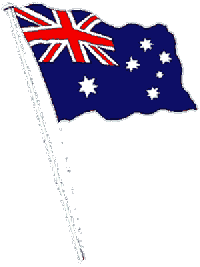
The History of The Australian Flag
Lt. James Cook (later to be promoted to Captain) landed on the Australian shore at Botany Bay on April 28, 1770. It was he who raised the Union Flag in the name of King George III.
His was the first recorded landing on the Australian east coast, and the act of raising the Union Flag at Botany Bay represented taking possession of the land in the name of the King.
In 1788 on the 26 of January, Governor Phillip raised the Union Flag on
the founding of the first white settlement in Australia, at Sydney Cove.
This date then became Foundation Day a national holiday, which is now celebrated as Australia Day.
Since Cook raised the Union Flag, there have been only two major variations in the official flag of Australia.
The Union Flag of Great Britain was not the 'familiar' Union Jack that we all know. The cross of St. Patrick had not yet been added to the then called "First Union Flag".
The first change to the flag came in 1801, when the St. Patrick's Cross was added, forming the Union Jack.
The second change came 131 years after Cook had landed. It was after the opening of the first Commonwealth Parliament, when the Australian Flag, with slightly different stars was used as our national symbol.
Details of the Flag
The Australian National Flag consists of a dark blue background
with the Union Jack contained in the upper hoist (top left corner).
The Federation Star points towards the center of the Union Jack and
has seven points. Each point represents the six Australian States and
the Commonwealth Territories. The five stars occupying the rest of the flag represent the Southern Cross.
The four larger stars, have seven points, and are equally sized. The small star has 5 points.
Union Jack
|
|
The St George Banner (the red +) was originally the National Flag of England. |
|
|
The Banner of St Andrew (the white x on blue) was then added in pursuance of a Royal Proclamation, dated 12 April, 1606. The result was the Union Flag which would have been flown by Captain Cook when he set foot at Botany Bay in, 1770. |
|
|
November 5, 1800 was when the King in Council approved the addition of the Cross of St Patrick (the red x) to the Union Flag. This formed the Union Jack as we know it today.
|
Southern Cross
The most dominant symbols in the Australian national Flag are the five stars of the
Southern Cross. This constellation of stars has a long history, credit being given to the
French astronomer Augustin Royer who named it "Crux Australia" in 1679. It was known however long before that. Dante, in his great work Purgatorio (1313) mentions it and gave to the four main stars of the group the symbolic moral virtues of Justice, Prudence, Temperance and Fortitude. There are of course five main stars in the group known as Aplha Crucis, Beta Crucis, Gamma Crucis, Delta Crucis and Eplsilon Crusis.
The original Flag unfurled in 1901 had the stars with nine, eight, seven six and five points respectively. A change was made in 1909 when all the stars, except the small Epsilon, were amended to seven points each. The probable reason for this was the ease of manufacture but it also standardised the symmetry of the stars as the Commonwealth Star had been increased from six to seven points in 1908 when Papua became part of the Commonwealth.
Flags of the Australian States and Territories
Australian Flag Poem
Keep The Flag
Our flag bears the stars that blaze at night
In our southern sky of blue
And that little old flag in the corner
That's part of our heritage too,
It's for the English, the Scots and the Irish
Who were sent to the end of the earth
The rogues and the schemers and dreamers
Who gave our Australia its birth.
And you who are shouting to change it
You don't seem to understand
It's the flag of our laws and language
Not the flag of a far away land
There are plenty of people who'll tell you
How when Europe was plunged into night
The little old flag in the corner
Was their symbol of freedom and light.
It don't mean we owe our allegiance
To a forgotten imperial dream
We've the stars to show where we're going
And the old flag to show where we've been
It's only an old piece of bunting
It's only an old coloured rag
But there are thousands who died for its honor
And fell in defence of our flag.
Written by an anonymous Australian














Australian Flag Australian Capital Territory Victoria New South Wales Queensland South Australia
VK VK1-- VK2-- VK3-- VK4-- VK5--








Western Australia Tasmania Northern Territory Torres Strait Islands Christmas Island Norfolk Island
VK6-- VK7-- VK8-- VK VK9X- VK9N-






Lord Howe Cocas & Keeling Australia Customs Australian Federal Aboriginal Flag Australian South Sea
Island Islands Police Islanders



Defence Force Ensign Naval Ensign Air Force Ensign RAF Ensign Civil Ensign Australian Civil Aviation
Other Islands of Australia
VK0 -- Australian Antarctica, Heard Island, Macquarie Island
VK9C -- Cocos-Keeling Island
VK9L -- Lord Howe Island
VK9M -- Mellish Reef
VK9N -- Norfolk Island
VK9W -- Willis Island
VK9X -- Christmas Island



Queen Elizabeth II Queensland Queensland 1st Flag
Personal Flag in Seperation Flag with Queen Victoria
Australia 10 Dec 1859 22 Mar 1870


Boxing Kangaroo Eureka Flag
